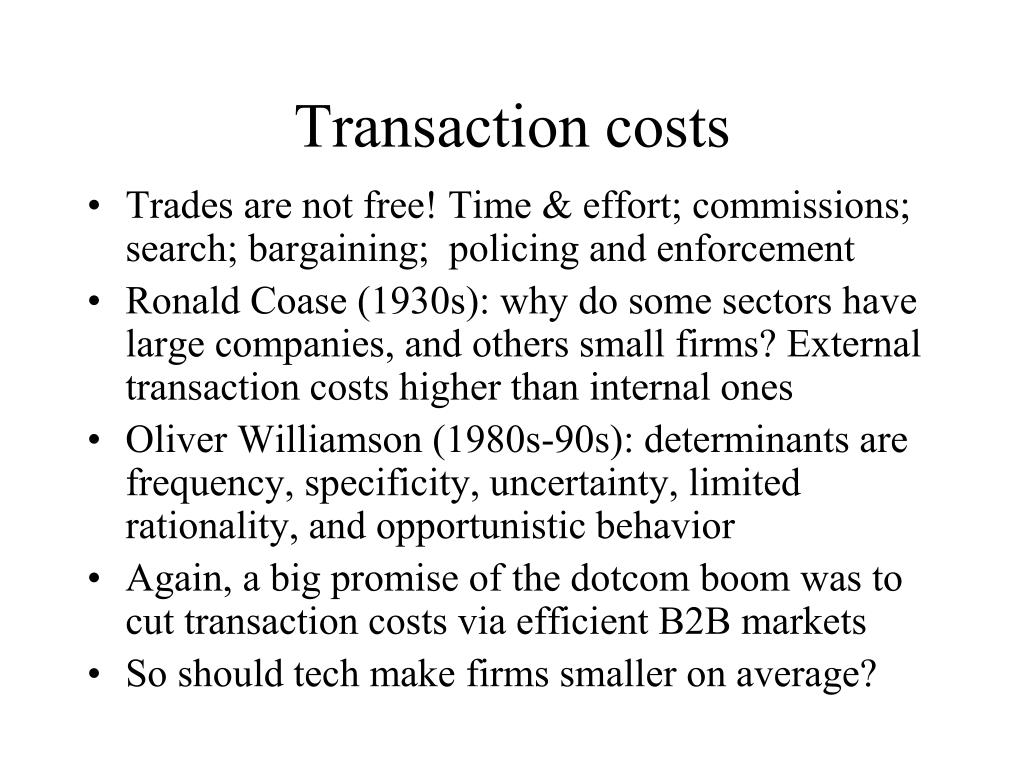
These kinds of emotional costs are an example of bargaining costs. For example, if you're negotiating with your boss over a raise, you might feel uncomfortable asking for more money or feel bad about asking for more money. Bargaining costs can be either emotional, social or financial.
Transaction costs how to#
Related: 10 data analytics certifications and how to get them Bargaining costsīargaining costs are the costs two parties incur when they negotiate a contract. This cost can also refer to the search for information or a good. If they manage to find someone who is available and willing to work for them, they then conduct an interview process before deciding whether they want to hire them. This can take time and money as some job boards charge employers a fee per post. For example, if they want to hire someone with expertise in data analytics, they would create an advertisement for the role. Search transaction expenses are a type of cost that arises when a company looks to hire a new employee. This is because cost comes from the fact that it's now necessary for them to store their inventory somewhere and put it away correctly so it doesn't incur damage. For example, if you buy a computer online but wish to pick it up yourself in-store, your purchase might result in an implicit transaction cost for that retailer. It can be either positive or negative, depending on whether the transaction has a net positive effect on your business. Instead, it results from the process of completing a transaction. Related: How to become a restaurant manager (with steps and tips) Implicit costsĪn implicit transaction cost is a cost that isn't a direct payment. For example, if you went to a restaurant and ordered a steak dinner, your explicit transaction expenses would be your meal and tip. This means that it's the main type of transaction cost associated with the buying of a good. Businesses typically consider these costs explicit because they're directly related to the transaction itself, rather than being an indirect cost from other actions. Here's a list of the different types of transaction expenses that you may encounter: Explicit costsĪn explicit transaction cost is a cost that you can easily measure, such as the fee that you pay to withdraw cash from an ATM. Related: What is direct cost (plus comparisons and examples)? What are the different types of transaction expenses? People usually call the cost of these transactions 'explicit transaction cost' as it's easy to calculate the money businesses spend on them. This is because brokerage firms charge commission fees for each trade that you make and other fees for various services.

Depending on the circumstance, a transaction can be rather costly, especially if you buy stocks or bonds through a brokerage firm. They include the price of buying or selling an asset and any fees that a third party subsequently assesses, like service charges. Transaction costs are the expenses associated with completing a financial transaction.

In this article, we look at what transaction costs are, what the different types are (with examples) and what their benefits are. They can also include any fees that are further associated with buying or selling a good/service, such as commissions and interest rates. This means that transaction expenses can include all of the money that a company spends on expenses like advertising, marketing and other sales tools.

Transaction expenses are the costs people and companies incur when they buy or sell a good/service.


 0 kommentar(er)
0 kommentar(er)
